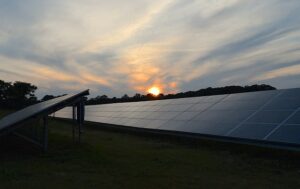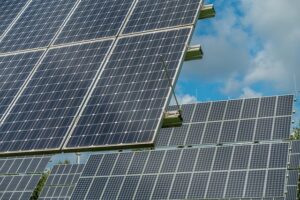
Solar Panels and Energy Independence: Breaking Free from the Grid
In an era characterized by rapid technological advancements and an increasing awareness of environmental issues, energy independence has become more than just a buzzword—it represents a transformative movement towards sustainability and resilience. At the heart of this transition lies solar energy, a resource that not only harnesses the sun’s power but also offers homeowners and communities the ability to break free from traditional energy grids.
The Importance of Energy Independence
Energy independence refers to the capacity of individuals, communities, or nations to fulfill their energy needs without relying on external suppliers. This concept is crucial in creating sustainable environments that promote economic stability, ecological preservation, and national security.
When a community is energy independent, it significantly reduces its vulnerability to fluctuations in energy prices, geopolitical tensions, and natural disasters that can disrupt energy supplies. Moreover, by fostering self-sufficiency in energy production, we can pave the way for a cleaner, more sustainable future.
Understanding Solar Energy
Solar energy is derived from the sun’s radiation, converted into electricity or heat using sophisticated technologies. Solar panels, the most common form of solar power technology, transmit sunlight through photovoltaic cells that generate direct current (DC) electricity. This electricity can then be converted into alternating current (AC) for residential use or stored in batteries for later consumption.
The appeal of solar energy lies not only in its sustainability but also in its accessibility. With advancements in technology, the efficiency and affordability of solar panels have improved dramatically, making them a feasible option for many households and businesses.
The Role of Solar Panels in Achieving Energy Independence
Solar panels provide a means for individuals and communities to generate their own electricity, significantly reducing reliance on fossil fuels and central grid systems. The integration of solar technology into residential and commercial environments contributes to energy independence in several vital ways:
Cost Savings
One of the most compelling reasons to invest in solar panels is the potential for significant cost savings on energy bills. By generating your own electricity, you can reduce or even eliminate your dependence on grid electricity. Once installed, solar panels typically require minimal maintenance and allow homeowners to enjoy lower energy costs over time, making them a financially sound investment.
Energy Security
Solar panels empower individuals and communities with the ability to produce their own energy. This independence can be especially crucial during emergencies or natural disasters when power outages become a common reality. With solar energy systems, users can maintain electricity supply, ensuring access to essential services and improving resilience.
Reduction of Environmental Impact
Transitioning to solar energy fosters a reduction in greenhouse gas emissions. Solar energy is a clean, renewable source that does not produce harmful pollutants, contributing to better air quality and a lower carbon footprint. By investing in solar technology, individuals can play a vital role in combating climate change while supporting the transition to a more sustainable energy landscape.
Community Empowerment
The adoption of solar panels can invigorate local economies by creating jobs in installation, maintenance, and manufacturing, contributing to community development. Furthermore, when communities collaborate on solar projects, the collective efforts can lead to shared energy resources and greater energy reliability.
Key Considerations When Transitioning to Solar Energy
While the benefits of solar panels are extensive, several factors should be considered before making the leap toward energy independence:
Initial Investment
The upfront costs of purchasing and installing solar panels can be a barrier for many homeowners. However, various financing options, tax incentives, and rebates may alleviate this challenge. Many government programs and initiatives encourage solar adoption, making it easier for homeowners to invest in their energy independence.
Location and Orientation
Solar panel efficiency is heavily influenced by geographic location, climate, and roof orientation. Homes with south-facing roofs often receive more direct sunlight, but advancements in solar technology have increased the efficiency of panels that can be installed in diverse orientations. Homeowners should consult with local solar experts to assess the feasibility of a solar energy system tailored to their specific circumstances.
Energy Storage
To maximize the benefits of solar energy, homeowners can consider integrating battery storage solutions into their systems. Energy storage allows users to store excess solar energy generated during sunny periods for use during cloudy days or nighttime. This feature further enhances energy independence and ensures a consistent supply of electricity.
Real-Life Examples of Energy Independence through Solar Power
Various communities and individuals worldwide have successfully transitioned to energy independence through solar power. Their stories reflect the diverse applications of solar energy and its transformative potential:
1. The Community Solar Farm in Colorado: A cooperative initiative, this solar farm allows community members to invest in solar energy collectively. Participants benefit from reduced energy bills while contributing to a sustainable energy future.
2. The Off-Grid Homesteader: Many individuals living off the grid have adopted solar panels as their primary energy source. By optimizing their energy production with solar arrays and battery storage, these homesteaders demonstrate that independence from traditional energy sources is possible.
The Future of Solar Energy and Energy Independence
The future of solar energy is bright, with ongoing technological advancements promising even greater efficiency and affordability. Policymakers, businesses, and individuals are increasingly recognizing the importance of energy independence as a means of enhancing national security, mitigating climate change, and fostering sustainable communities.
As solar technology continues to evolve and adapt, the prospect of achieving energy independence will become a reality for more people. New developments, such as solar shingles and community solar projects, are paving the way for broader adoption of solar energy, empowering individuals and communities to take control of their energy futures.
Conclusion
Solar panels present a powerful opportunity to break free from the constraints of the traditional energy grid. By investing in solar energy, individuals and communities can enhance their energy independence, reduce their environmental impact, and foster a more sustainable and secure future. The journey toward energy independence through solar power is not merely a personal endeavor; it is a collective movement towards a brighter, greener tomorrow. As we navigate the challenges of climate change and energy security, embracing solar energy can provide the pathway toward a more independent, sustainable world.



